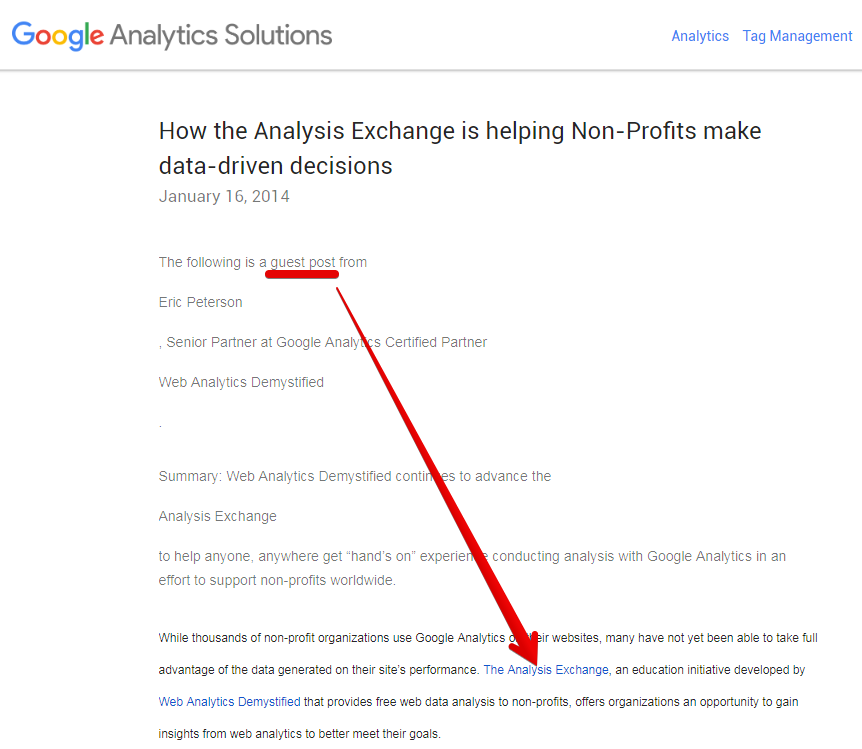With guest blogging, you can acquire numerous links. However, Google penalizes guest blogging.
Which statement is true? Is it worth taking the risk?
In this article, I will demonstrate the impact of guest blogging on search engine optimization and the risks you may encounter.
Google: Guest blogging is dead.
Let’s start with what Google says about this.
In 2014, Matt Cutts, the head of Google’s webspam team, made a clear statement on this matter:
"If you are using guest blogging to get links in 2014, you should probably stop. Why? Because over time, this practice has become more of a spam technique."

Is it clear? According to Google, as early as 2014, guest blogging had become so frequently used and of low quality that it was considered a spam technique.
However, Matt Cutts also adds that he doesn’t want to throw out the baby with the bathwater. Guest blogging is a good method if you do it for branding, building a community, or raising awareness, but not for SEO purposes.
In 2017, Google’s official blog warned about a significant increase in spam links within guest blogs.
John Mueller, a Google expert, even stated that he would label all links from guest blogs to his site with a „nofollow” attribute, even if they come from high-quality articles.
The examples could go on, but the picture seems clear: Google does not endorse guest blogging.
Google is guest blogging
The irony of the story is that after Matt Cutts published his famous blog post, he himself gave an interview to another website where they linked back to his blog post three times, and he received sixteen (!) links to various Google products.
Each of them was a dofollow link.
If we visit Google’s official blog site, we can still see many articles written by guest authors who link back to their own websites.

How can guest blogging be dead if even Google does it?!
Of course, there was a huge outcry after Matt Cutts’ statements. Rand Fishkin, the founder of Moz.com, objected to the idea that guest articles on Moz’s blog would be considered spam. And let’s add that he is completely right. The articles on Moz.com represent the pinnacle of the industry.
Let's make everything clear!
If even on Google’s blog site, guest authors can have their links, then what is Google’s issue with guest blogging?
Well, the problem is that it has become widespread, and a lot of low-quality guest articles have emerged. These can be clearly classified as spam, of very poor quality, and solely serve SEO purposes.
Matt Cutts, and almost everyone else who had a website in the English-speaking world, received numerous emails from people wanting to place guest blogs on their websites – often paying money for them.
Google had enough of this. Let’s look at some specific examples:
Spam-like guest blog
This excellent example was discovered by Marie Haynes and it reveals everything about what a spam guest blog looks like:

As you can see, the author’s bio is filled with keyword-stuffed links. The associated articles are also typically of very poor quality.
Medium-quality guest blogs
The medium-quality guest post is typically readable for users and may contain one or two useful pieces of information, but it is far from being considered outstanding. The articles usually align with the hosting site’s profile, but the links often point to a page that has no relevance to the hosting site.
A perfect example of this is this page: travelblat.com/5-quick-tips-on-getting-the-best-flight-deals-this-holiday-season/
High-quality guest blogs
High-quality guest blogs are the ones that truly bring value. Examples of such posts can be found on Moz.com, and perhaps this article is also one of them.
Let’s see what Google thinks about this!
Matt Cutts talks about not accepting guest blogs from others unless you know them personally.
Majd egy interjúban arról beszél, hogy van sok olyan vendégcikk, amelyet:
Then in an interview, he discusses that there are many guest blogs that:
"...a fantastic author with deep knowledge in the subject, who put a lot of effort into the article, editing and refining it, and then published this piece on a reputable website."
It seems like this is okay. Then Matt Cutts explains that the problem is that guest blogs have become too widespread, and the overall quality has declined due to spam techniques.
What’s the lesson?
Well, it appears that if a guest blog is of outstanding quality, has been worked on extensively, is relevant, useful, and maybe even written by someone you personally know, then there won’t be any issues.
Moreover, as Matt Cutts put it:
"Such articles provide an excellent opportunity to make your name known, enhance your reputation, increase visibility, and potentially build links to support your SEO efforts.

So, everything is fine. Guest blogging can be useful. With one exception.
Do it wisely!
There are examples abroad where outstanding quality but excessive guest blogging can lead to manual penalties. So, use it wisely as well!
It’s true for every link-building method that it works when it doesn’t dominate your link profile. This applies to guest blogging too.
In summary, pay attention to:
- Outstanding quality, lengthy articles, high user experience, in short: "quality content"
- When acquiring links through guest blogging, avoid using keyword-stuffed links excessively. If you do use them, make sure to vary them and also have more natural links (using names, domain names, brand names)
- Don't let only one subpage receive links if you acquire links from multiple guest blogs
- Rather get links from the body of the article instead of the bio section
- The articles should not be cookie-cutter; each one should be unique and align with the profile of the hosting site and your expertise as well
The Hungarian situation in brief
And finally, sticking to the topic of risks, it’s worth mentioning the situation in Hungary as well.
In our country, Google very rarely applies manual penalties. It’s really as rare as a white raven.
Because of this, the risk of guest blogging is even lower than in English-speaking areas. Just having a few links from guest blogs is unlikely to get you penalized, so feel free to use this link-building opportunity.
Moreover, Google’s automated algorithms have a hard time identifying Hungarian link patterns. They are simply too small in size. With guest blogging, the system often considers spam techniques and links as valid links.
Hence, taking the risk of guest blogging into account, considering the automated algorithms, it’s practically close to zero if you follow and apply the principles mentioned above.
The SEO benefits of guest blogging
I hope I managed to convince you why there is no need to fear guest blogging if done correctly. In this section, I’ll try to show you why it’s worth doing.
Guest blogging works.
I hardly need to prove that links play a fundamental role in ranking. Google’s senior executive, Andrei Lipattsev, himself acknowledged that content and links are the most crucial factors in ranking.
Alongside content, links are considered the most important ranking factor. Links obtained from guest blogs also contribute to the evaluation.
Moreover, these links can be particularly valuable because:
- You receive them from a domain relevant to your topic (if you took my recommendation into account)
- You get them from good quality content
- You get the link from within the body of the article
- In many cases, both the anchor text and the linked page are consciously chosen
A success story – backlinko.com
Brian Dean is one of the most well-known names in the SEO industry. His one-man website, Backlinko.com, competes with big brands like Moz.com or Ahrefs.com in highly competitive niches. With over 200,000 unique monthly visitors to his website, he dominates the SEO segment.
How is this possible?
Brian Dean doesn’t hide the fact that he worked hard to bring Backlinko.com to the forefront. He wrote over 200 guest blogs that link back to his website.
Thank you to Attila Szuhi, the founder and editor-in-chief of ite.hu, for the article! We have already guest-blogged on his website about the basics of WordPress speed optimization, and we encourage you to take advantage of its benefits as well!
Istvan Gelencsér
Aaron Szabo

We create custom CMS websites tailored to our clients, keeping marketing, SEO, and UX principles in mind, providing the best possible cost-value ratio.

